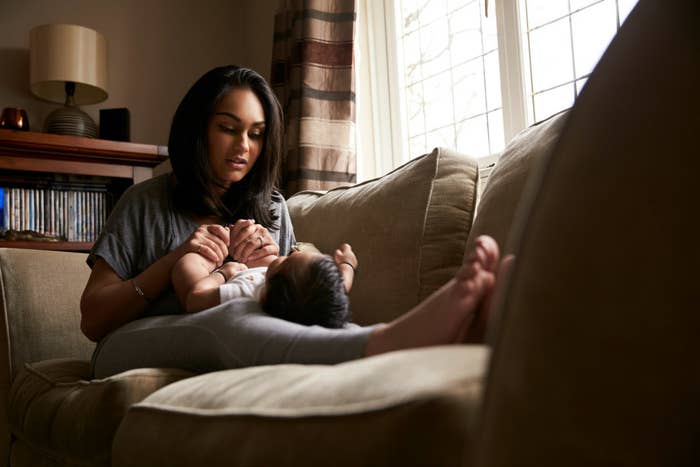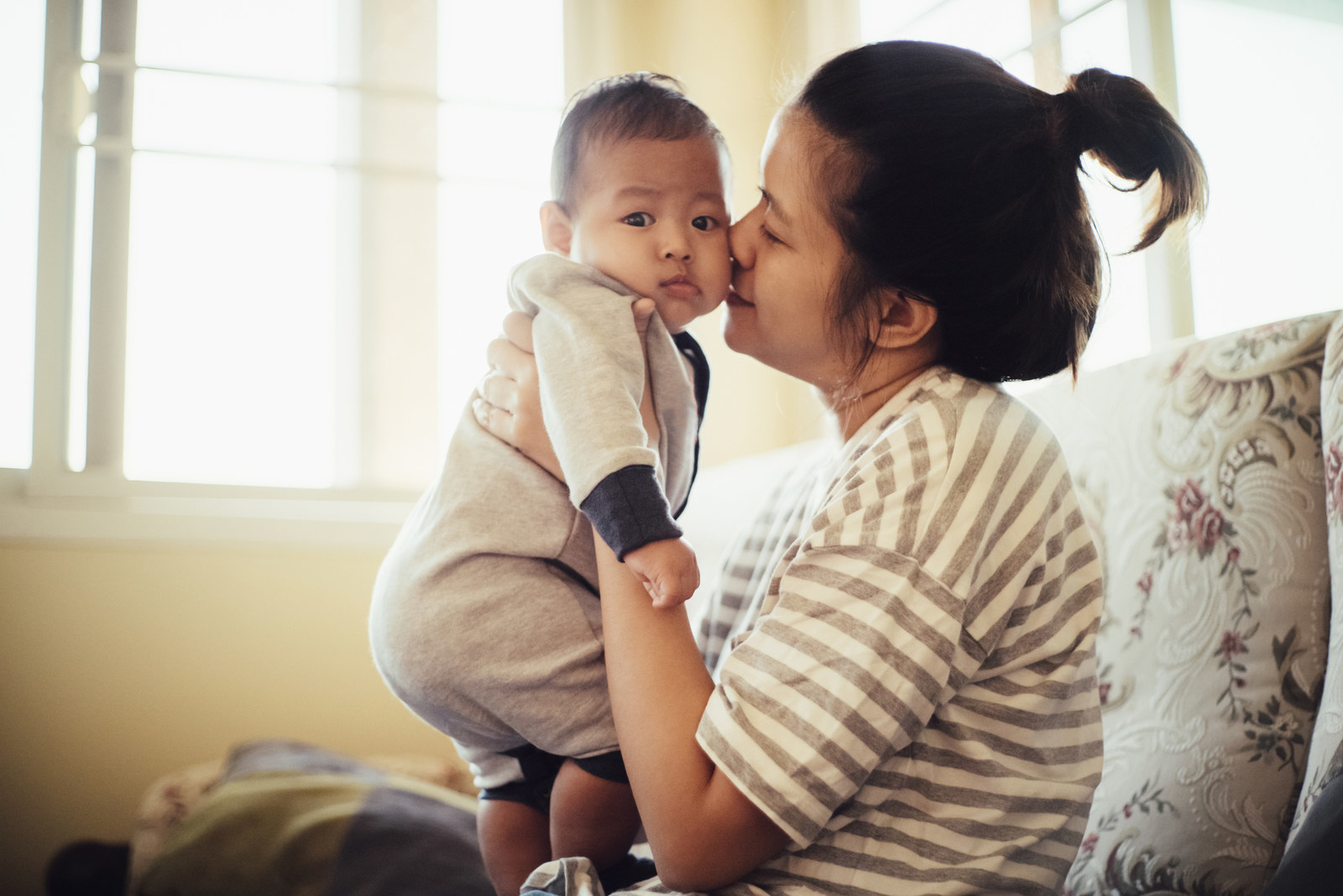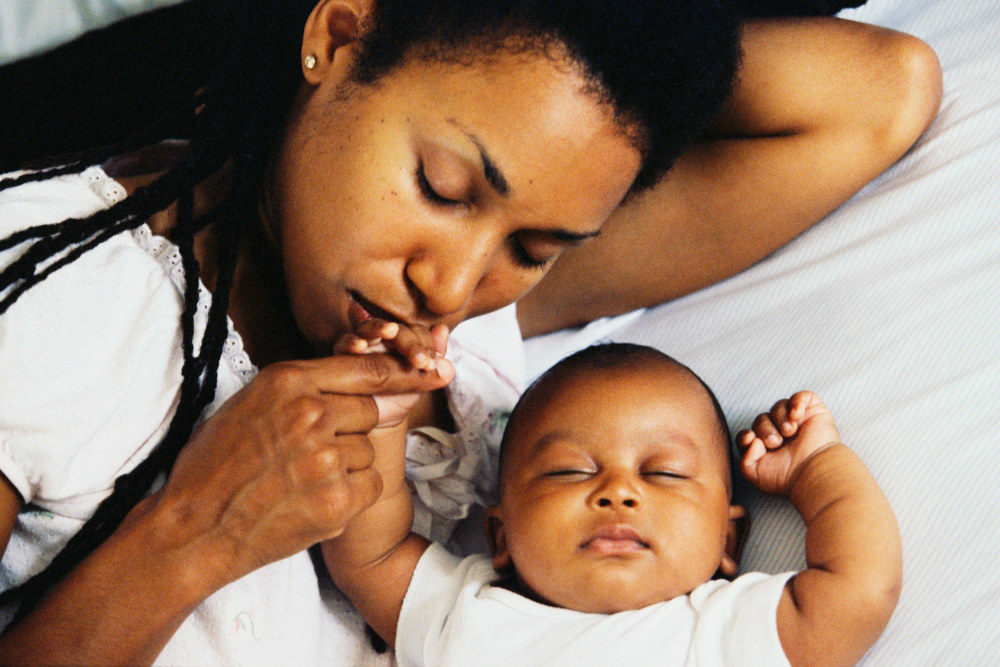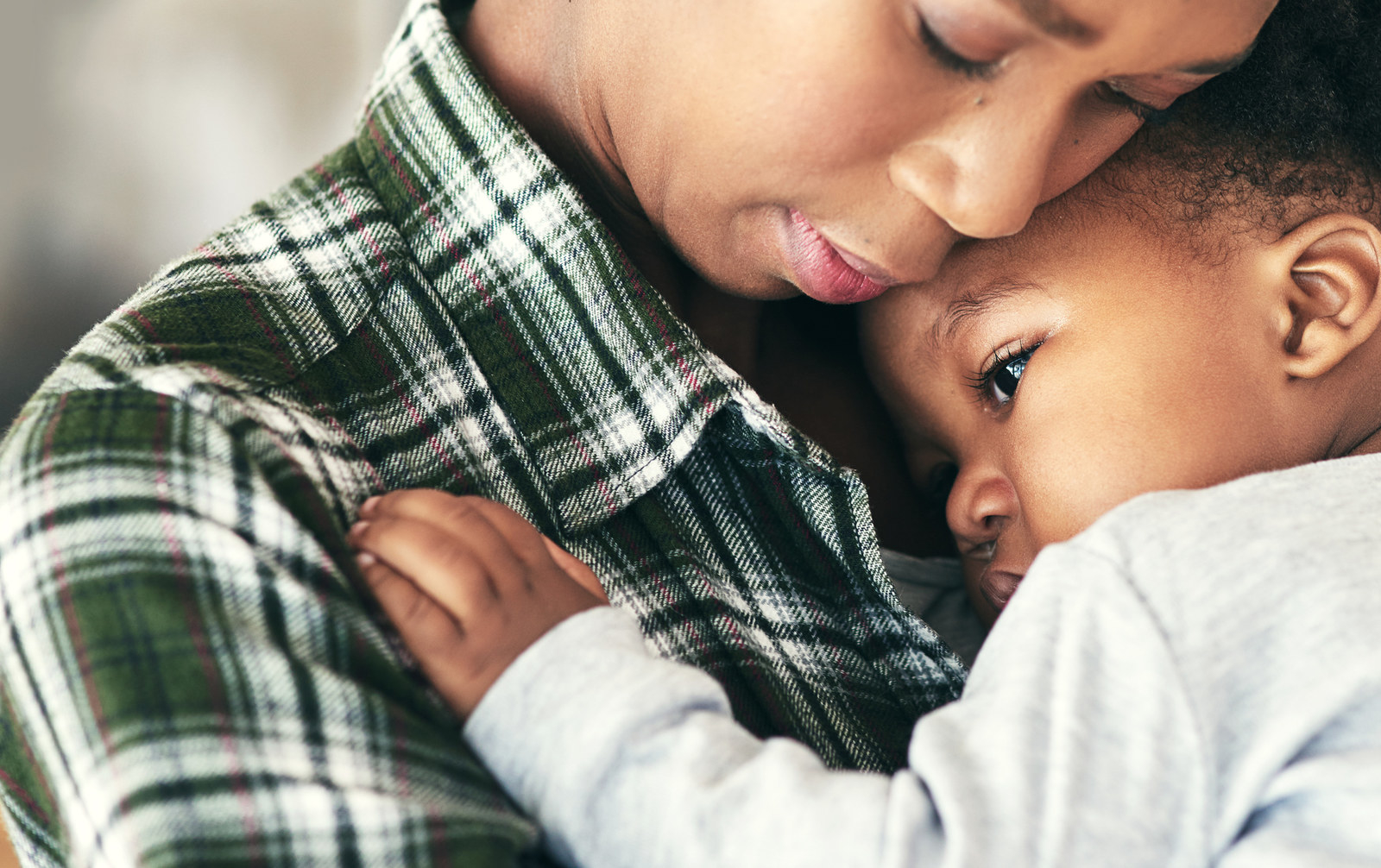
For the first couple weeks after I had my son, every day offered new challenges, like getting more than two hours of sleep in a row and discerning between different types of baby cries (Diaper? Hungry? Gas? TELL ME.) But around the three-month mark, parenting seemed downright impossible. When anyone asked how I felt, though, I gave a clichéd answer: “Fine! We’re doing great!”
Which was...technically true. Labor and delivery went well, breastfeeding worked, and I loved my little babe. My husband and I were healthy and financially secure; I had a job I liked and felt supported by my team at work. I really didn’t have a “reason” to be so incredibly anxious. However, I also sort of felt like I was drowning every single day, or like I could disappear — which consequently made me feel even more guilty for being a jerk of a mom who couldn’t get her shit together.
When I finally mentioned something to my pediatrician, he asked why I hadn’t said anything sooner, and I realized I didn’t even consider that as an option at the time. Those mental health forms for new moms at postpartum doctor’s visits? I thought they were for people with serious problems, not me. In hindsight, I wish I had been more open about my anxiety, and I wonder how medication or therapy might have helped.

If you think you might be struggling with postpartum depression or anxiety, or you’re not even sure what symptoms to look for, then here are six reasons to be honest with your healthcare provider — so you can get the support you may need.
1. Postpartum visits are intentionally designed to benefit you and your baby.
Dr. Shilipi Agarwal, a family physician and mom of two, has been on both sides of postpartum visits, as a doctor and a new mother. She tells BuzzFeed that she highly recommends parents take advantage of both provider and pediatrician visits to talk mental health, even if things seem to be going okay, because these are opportunities to cover the following topics:
• Pain, recovery and healing related to a vaginal or c-section birth, which could include a breast or pelvic exam
• Contraception (yes, really)
• What kind of support system you have in place
• Your emotional state, including “bad” or confusing feelings
• When to resume exercise or sexual activity


2. New moms frequently think their symptoms aren’t “bad” enough, and attribute them to stress, baby blues, or a bad day.
“In terms of the depression screening, the mom will fill out a questionnaire and spend time talking with us about how she is adjusting and coping,” says Agarwal. “But many new moms cannot gauge the difference between regular life changes that come with having a baby and postpartum blues or postpartum depression. I like to ask about daily routine — sometimes I find the mom is not eating well or sleeping well. In some cases, breastfeeding and nursing is very frustrating, and that can contribute to anger, anxiety, and depression. Often, moms are ashamed of these feelings, so it is really helpful to talk with your doctor. They can help normalize them, and ask you to come back in or call you to check on you in a few days or weeks.”

To illustrate, here’s how three different women describe their experiences with PPD:
“I wasn’t weepy or sad; I was much more angry and mad. I never felt any anger toward my baby, it was always directed at my husband. So when I had my check up with my OB, I never felt the need to tell her, because all of the ‘signs’ that I thought meant depression weren’t what I was experiencing. Not only that, I felt incredibly embarrassed and ashamed to tell anyone that I lashed out at my husband because he didn’t make the bottle the ‘right way’ ... or whatever silly thing that set me off that day. Even after about 6 months I still felt the same anger and again I pushed it off as being tired, or thinking that I was the only person who knew how to care for our newborn.” —Kate H.
“I had racing, obsessive thoughts. Insomnia. Erratic behaviors, like impulsive shopping online and at the store where I would buy unnecessary things. Shortness of breath. Feelings of helplessness, like things would never get better. Loss of appetite, rapid weight loss and stomach pains that would come in waves.” —Chelsea S.
“I didn’t even realize that what I was going through was out of the norm until I was past it. I definitely mentioned to my doctor that I was tired and hormonal, but she asked me the typical questions about thoughts of hurting your baby or not connecting with baby, and I never experienced any of that, so I didn’t really think anything was wrong. I thought it was probably just normal baby blues...until all my friends had babies and couldn’t relate to the anxiety I felt. I would go to family shit and smile and be happy and then cry in the car on the way home and hold my son for four hours. I never heard voices or felt angry or sad, per se, just like, overwhelmed. Constantly. And super uncertain and guarded.” —Samantha M.

3. Moms also assume they *should* be able to handle any struggle on their own.
According to Dr. Sherry Ross, an OB/GYN and women’s health expert at Providence Saint John’s Health Center, new moms may hide how hard it is for them to take care of a newborn, because they feel inadequate, embarrassed, ashamed, weak, or like a failure if it doesn’t come easy right away. Which is ridiculous, because parenting is not easy, particularly if you’ve never done it before.
However, there’s an ongoing narrative about motherhood to the tune of My Life Had No Meaning Before I Had Children — not to mention the insane levels of judgment lauded against mothers for basically any choice that’s not 100% self-sacrificing. And, says Monk, when the first few months after baby are “supposed” to be the happiest ever, it’s no wonder women feel reluctant to admit they’re actually not happy at all.


4. But postpartum depression/anxiety is actually incredibly normal, because, hormones.
One of the main things Agarwal wants women to know is that postpartum symptoms can easily be caused by the hormone rollercoaster that is pregnancy, labor and delivery: “Your levels are extremely high when you’re pregnant, and as soon as you deliver, these values plummet...but no one really tells you this, so you feel ashamed and often alone.”
Moving away from breastfeeding can also be another catalyst for a hormone drop, and contribute to mood swings, depression and anxiety. “I called my doctor both times when I had the ‘can’t stop crying for no apparent reason’ moment,” says Lindsay K. “It hit as soon as I started weaning, which I didn’t know was a thing. I pretty much said, ‘I think there’s something wrong with me, I can’t stop crying, but I don’t have anything to be sad about. No, I’m not suicidal, no, I’m not going to hurt my kids. I’m just tired and sad and unmotivated to do anything.’ My doctor got me in immediately; I was ashamed to be on meds, but did it because I was terrified of feeling the way I did. I wear my badge proudly now because I realized how many women are not aware it is so normal to feel like that.”

5. It is treatable — and you’re not a failure if you need therapy and medication to cope.
“Suffering from depression negatively affects the mother and her quality of life as well as her ability to bond with her newborn and the quality of all of her relationships,” says Monk. “Depression is treatable; doing so will enable the mother to feel like herself again, or even better than before, and will ensure that she is able to be what we like to call ‘a good enough mother.’ No mother, no parent, is perfect — and part of optimal parenting and treating depression is removing unreachable expectations that foster guilt, worry, and self-criticism.”
Treatment of postpartum depression usually includes a combination of drugs, including antidepressants or anti-anxiety medications, and therapy. And for women who worry about taking meds while breastfeeding, Dr. Ross says it’s both safe and acceptable to do so under the care of your doctor.

Here’s what three moms learned from treating postpartum depression:
“At my six week postpartum appointment, the doctor barely got the question out, ‘So how are things going?’ and I broke down into tears. I was very open with my doctor about how HARD being a new mom is. I wish I would’ve known more about postpartum depression and anxiety prior to having my daughter. But opening up right away was the best decision for me. It was scary and empowering all at the same time. I’ve been on a small daily dosage of Zoloft ever since and I’ve never felt better.” —Erin D.
“I got on medication and met weekly with a therapist. It helped so much to have that, and within a few months some of that dark fog began to lift. Overall, I feel like it's really hard to see and process everything in the moment. I knew about postpartum depression, so I figured I would notice right away if I was struggling or needed help, but it's so murky with a newborn. I have gotten better about asking for help, and I still see a therapist! I’m glad I took the time to heal. Even now, looking back I think, ‘Wow, I was in a dark place, and that is nothing to joke about or mess around with.’” —Amanda O.
“With my first kid, I just did talk therapy because I was afraid of going on meds. Since I was breastfeeding, I had it in my head that I couldn't breastfeed and take anti-anxiety medication. No one had told me this, it was just some weird anxiety thing I had concocted in my head. I kept telling myself: you're just overwhelmed, this is what all new parents go through, it's just sleep deprivation, it'll end soon. I think I was almost two months postpartum before I saw a therapist, and even when she suggested meds, I kept saying, ‘Let's wait and see.’ With my second, my midwife told me in the hospital that if I wasn't feeling like myself two weeks after birth, then I should make an appointment to see my doctor and get on some medication. This time I listened. When the ‘baby blues’ didn't subside, I immediately texted my doctor. I was scared to take meds, but this time I knew it wasn't worth going through all the pain of postpartum anxiety. I wanted to be present for my baby and my family, and not in my head. I wanted to sleep. And let me tell you, within a week of starting the meds, I felt like a completely different person.” —Chelsea S.

6. The sooner you speak up, the sooner you can get help.
Monk says she has three primary goals with new moms who might be dealing with postpartum depression: empathize with how they feel, validate their courage in sharing, and reassure them that there’s help. Next, she prioritizes a support team, which can be family and friends as well as a psychologist, psychiatrist or social worker.
“The key to maintaining your survival is to have open and honest communication with your partner and family,” Ross says. “If you or your loved one experience signs of depression and withdrawal, it’s important to seek out help as early as possible. The more you can speak openly about the struggles you are experiencing with postpartum depression, the sooner you will feel better.”
For more information on postpartum depression, visit the National Institute of Mental Health or Postpartum Support International. For help connecting to resources, call PSI's hotline at 1-800-944-4773 or send a text to 503-894-9453. If you’re thinking about suicide or just need someone to talk to right now, you can get support by calling the National Suicide Prevention Lifeline at 1-800-273-TALK (8255).
